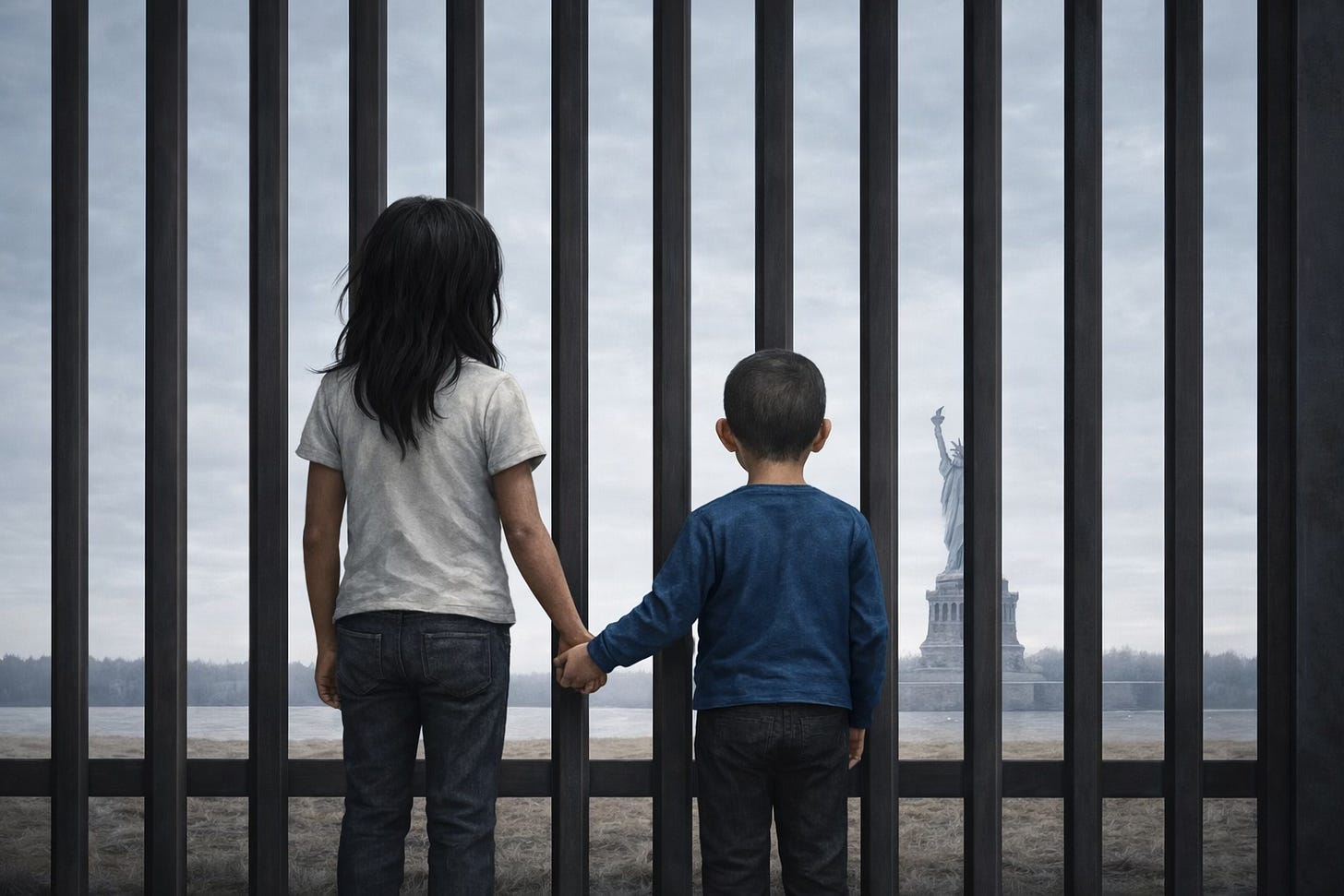Politics First, Refugees Last
The 7,500 cap shows how America’s refugee policy became a tool of foreign policy.
Seven thousand five hundred is not a refugee policy. The lowest ceiling in the program’s history, a 94 percent plunge from 125,000, arrived with a second punch. The tiny pool would be steered to one politically useful identity group, Afrikaners from South Africa, under a new executive order that repurposed a humanitarian program as a tool of diplomatic punishment.
A picture, not a chart. A family on a tile floor with two duffel bags. Travel booked. House keys handed back. Boss notified. The airport day never came. Admissions were suspended indefinitely, subject to a fresh test of what supposedly served the best interests of the United States. Vetted people were stranded, some after years of screening, because the program was put on ice by fiat.
In open defiance of the law.
Lawmakers used that phrase after the White House finalized the number near the September 30 deadline without the mandatory consultation with Congress required by the Refugee Act of 1980. The guardrail was ignored. The consequences landed on people who had already cleared security.
Executive Order 14204 told State and DHS to put white South Africans at the front on the grounds of race-based discrimination, then tied the move to South Africa’s diplomacy on Israel at the International Court of Justice and its renewed ties with Iran. That is a humanitarian channel turned into a cudgel. Even Pretoria rejected the premise that Afrikaners face persecution that meets refugee-law thresholds. Refugee advocates called the focus unserious and overtly biased. The pattern is familiar, and not in a good way.
Follow the money, then follow the rubble. Years of cuts gutted the resettlement network that actually receives people. Washington told agencies handling fewer than 100 arrivals to close sites. Staff were laid off. Housing pipelines collapsed. Later, when another administration raised the ceiling back to 125,000, the system could not move fast, because the pipes had been smashed. Only after a funding surge for the Office of Refugee Resettlement and new tools like Safe Mobility Offices and the Welcome Corps did admissions climb to 100,034 in 2024, the highest since 1995. Destruction is cheap. Reconstruction is not.
Numbers and facts, short and clear
7,500. Lowest cap ever. No previous president went below 60,000.
125,000. Vetted refugees left in limbo when admissions were frozen.
$30,962. Lost U.S. economic output per missing refugee per year. $6,844 in lost public revenue per person. Permanent losses, not a temporary belt-tightening.
2.5 million+. UNHCR resettlement need in FY 2026, met with a U.S. ceiling that barely registers.
The defense deserves a fair hearing. The line goes like this. A smaller number serves national interest and keeps vetting tight. Concentrating limited slots on Afrikaners addresses racial discrimination that the host government refuses to fix. The priority doubles as a signal to Pretoria to stop what Washington calls unjust behavior. Focus equals impact. That is the pitch.
Now the record. The law requires consultation with Congress. That did not happen, which is not a rounding error. It is a choice to bypass the statute that underpins the program. The Afrikaner priority breaks with the baseline principle of non-discrimination that says need, not identity, drives selection. The South African government disputes the persecution claim. The White House never offered a transparent method tying 7,500 to global need. And the safety pretext collapses on contact with the fact pattern, since the people left behind had already cleared vetting. Every leg of the defense wobbles when the receipts show up.
Something else got normalized along the way. A four-decade consensus that hovered around 95,000 gave way to a floor at 7,500. Once the public is taught to accept a number that small, any future hardliner can point back and say, this is standard. That is how ratchets work in politics. Shrink the frame. Call the shrinkage normal. Repeat.
Gaps in the record should be flagged, not papered over. The Federal Register notice was described as forthcoming on October 31, but the text is not reproduced here. The share of the 7,500 set aside for Afrikaners is called primary, but no percentage is provided. The >125,000 stranded figure is not broken down by nationality or stage in the pipeline. Actual FY 2026 outcomes remain unknown. Those are big blanks that matter.
The moral ledger is not hard to read. A historic low cap. An identity-based carve-out. A dodge on the law. A wrecked infrastructure that took years and serious money to rebuild. A global need measured in millions met with a symbolic drip.
My Open Tabs:


